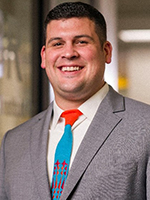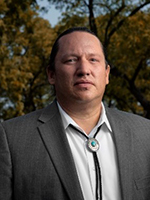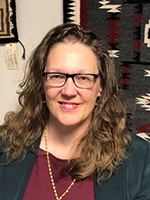Speaker Biographies
About the speaker

Evan White, Ph.D.
Principal Investigator and Director of Native American Research and the Electroencephalography Core
Laureate Institute for Brain Research
Dr. White is an enrolled member of the Absentee Shawnee Tribe of Oklahoma. He belongs to the Shawnee Chapter of the Native American Church of Oklahoma and the Whiteoak ceremonial grounds. He is a Principal Investigator and Director of Native American Research and the Electroencephalography Core at the Laureate Institute for Brain Research. He uses clinical cultural neuroscience to improve mental health outcomes among American Indians. A focus of this research is implementing multi-modal neuroscience and psychophysiology with a particular emphasis on EEG and ERPs. The goal of Dr. White's research is to integrate clinical and cultural neuroscience to identify modifiable factors as candidate treatment targets for mental health intervention and prevention.
About the discussants

Benjamin J. Barnes
Chief, Shawnee Tribe
Chief Barnes of the Shawnee Tribe was elected to his position in 2019. Prior to that, he served the Shawnee Tribe as Second Chief for seven years and was a leader in the tribal gaming industry for 20 years. The roots of Chief Barnes’ service go back to his volunteer efforts to revive the Shawnee language. Upon taking office with only a few fluent Shawnee speakers remaining, Barnes declared 2021–2030 the Decade of the Shawnee Language.
Chief Barnes passionately advocates for truth, accountability, reconciliation, justice, education, and human rights. His work, however, extends beyond service to his nation, bringing together truths and traditions in framing and crafting tribal policy and law. Most recently, Chief Barnes co-edited the book, Replanting Cultures: Community-Engaged Scholarship in Indian Country.
Being a member of his people’s traditional religious community in White Oak, Oklahoma, has framed his efforts to find redress to the harm traditional communities suffered from Indian boarding schools and reeducation centers. This lens has shaped Chief Barnes’ and the Shawnee Tribe’s activism at local, state, national, and international levels.

Maggie Boyett
Chief Communications Officer, Shawnee Tribe
A lifelong artist and dancer, Boyett received her foundational ballet training from Moscelyne Larkin of the Peoria Tribe and earned her bachelor’s degree from the University of Oklahoma School of Dance that was founded by Miguel Terekhov and Yvonne Chouteau of the Shawnee Tribe. She is named after her maternal grandmother, Ruthe Blalock Jones, an acclaimed visual artist and educator. Maggie and her family belong to the Shawnee ceremonial grounds in White Oak, Oklahoma. She has served the Shawnee Tribe as Chief Communications Officer since 2021 and resides in Oklahoma City.
About the moderators

Dawn A. Morales, Ph.D.
Director for American Indian and Alaska Native Mental Health Research
National Institute of Mental Health (NIMH)
Dr. Morales is Program Director for American Indian, Alaska Native, and Rural Mental Health Research at NIMH. She helps coordinate rural mental health research within NIMH and across the Department of Health and Human Services (HHS). Her subject matter expertise and interests focus on health disparities, special populations, environmental justice, suicide prevention, and the mental health of currently and formerly incarcerated people. She also has expertise in measurement, data science, valid use of statistical techniques, and how policy can influence sound choices in methodological and analytic strategies and improve replicability.
She has a particular interest in cultural and policy factors that influence the practice of science, especially methodological and statistical practices and cultural, educational, and policy factors that influence the use of theories in scientific research. She’s also interested in the history of science, including how ideas and innovations evolve over time. Prior to joining the National Institutes of Health (NIH), she worked as a research statistician. She earned a doctorate in Experimental Psychology from the University of California, San Diego.

Sarah E. Morris, Ph.D.
Chief, Adult Psychopathology and Psychosocial Intervention Development Branch
Head, Research Domain Criteria (RDoC) Unit
NIMH
Dr. Morris is the Chief of the Adult Psychopathology and Psychosocial Intervention Development Research Branch of the NIMH Division of Translational Research. Dr. Morris received her Ph.D. in Clinical Psychology from the University of California, Los Angeles in 2001. Following a post-doctoral fellowship at the Baltimore VA Medical Center, Dr. Morris joined the faculty at the University of Maryland School of Medicine. Her research focused on learning, reward processing, and self-monitoring in schizophrenia using event-related brain potentials and on remediation of cognitive deficits in schizophrenia. She joined NIMH in 2010 as program officer for the schizophrenia-spectrum disorders program and now leads a branch which manages a portfolio of research grants focused on adult mental disorders. Dr. Morris also leads the RDoC effort to promote research that explores novel methods to classify mental disorders.
About the presider

Susan Koester, Ph.D.
Acting Deputy Director
NIMH
Dr. Susan Koester is currently serving as the Acting NIMH Deputy Director of NIMH. In this role, Dr. Koester plays a part in defining the institute's research priorities, policies, and strategic initiatives and overseeing various aspects of NIMH's operations.
Since 2007, Dr. Koester served as the Deputy Director of the Division of Neuroscience and Basic Behavioral Science (DNBBS). The division supports research ranging from human genetics through molecular, cellular, integrative, and systems neurobiology relevant to mental disorders. In addition, Dr. Koester has co-lead the NIH Common Fund Genotype-Tissue Expression (GTex) Program and served as the NIMH liaison for the NIH Common Fund High-Risk, High-Reward Research (HRHR) programs.
Before joining DNBBS, Dr. Koester served as the Associate Director for Science in the NIMH Division of Intramural Research Programs (IRP) and as a science writer in what was previously known as the NIMH Office of Science Policy.
Dr. Koester received her Ph.D. in Neural Sciences from Washington University in St. Louis, completed a postdoctoral fellowship at the Salk Institute, and served as Senior Editor at Neuron.
